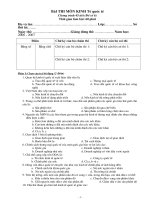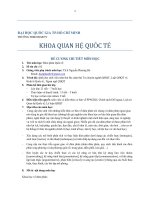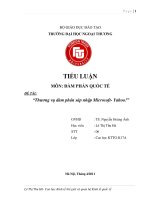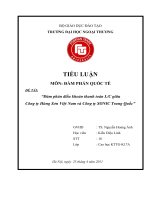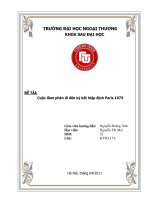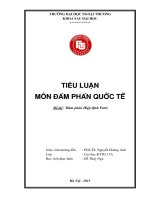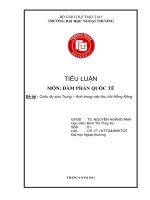slide đàm phán quốc tế ftu session 6 power in negotiation
Bạn đang xem bản rút gọn của tài liệu. Xem và tải ngay bản đầy đủ của tài liệu tại đây (536.44 KB, 24 trang )
Session 6
Power in Negotiation
1
CuuDuongThanCong.com
/>
Why Is Power Important to
Negotiators?
Seeking power in negotiation arises from one of
two perceptions:
1. The negotiator believes he or she currently
has less power than the other party.
2. The negotiator believes he or she needs
more power than the other party.
CuuDuongThanCong.com
/>
A Definition of Power
• “an actor…has power in a given situation
(situational power) to the degree that he can
satisfy the purposes (goals, desires, or wants)
that he is attempting to fulfill in that situation”
• Two perspectives on power:
– Power used to dominate and control the other–
“power over”
– Power used to work together with the other–“power
with”
CuuDuongThanCong.com
/>
Sources of Power –
How People Acquire Power
•
•
•
•
•
Informational sources of power
Personal sources of power
Power based on position in an organization
Relationship-based sources of power
Contextual sources of power
CuuDuongThanCong.com
/>
Informational Sources of Power
• Information is the most common source of
power
– Derived from the negotiator’s ability to assemble and
organize data to support his or her position, arguments, or
desired outcomes
– A tool to challenge the other party’s position or desired
outcomes, or to undermine the effectiveness of the
other’s negotiating arguments
CuuDuongThanCong.com
/>
Power Based on Personality
and Individual Differences
• Personal orientation
• Cognitive orientation
– Ideologies about power
• Motivational orientation
– Specific motives to use power
• Disposition and skills
– Orientation to cooperation/competition
• Moral orientation
– Philosophical orientation to power use
CuuDuongThanCong.com
/>
Power Based on
Position in an Organization
Two major sources of power in an organization:
• Legitimate power which is grounded in the title,
duties, and responsibilities of a job description and
“level” within an organization hierarchy
• Power based on the control of resources associated
with that position
CuuDuongThanCong.com
/>
Power Based on
Resource Control
• People who control resources have the capacity to
give them to someone who will do what they want,
and withhold them (or take them away) from
someone who doesn’t do what they want.
CuuDuongThanCong.com
/>
Power Based on
Resource Control
• Some of the most important resources:
–
–
–
–
–
–
–
Money
Supplies
Human capital
Time
Equipment
Critical services
Interpersonal support
CuuDuongThanCong.com
/>
Power Based on Relationships
• Goal interdependence
– How parties view their goals
• Referent power
– Based on an appeal to common experiences, common
past, common fate, or membership in the same groups.
• Networks
– Power is derived from whatever flows through that
particular location in the structure (usually information
and resources)
CuuDuongThanCong.com
/>
An Organization Hierarchy
CuuDuongThanCong.com
/>
An Organizational Network
Isolated Dyad
Star
Gatekeep
er
Liaison
Linking Pin
External
Environmen
t
Isolate
CuuDuongThanCong.com
/>
Power Based on Relationships
• Key aspects of networks:
– Tie strength
• An indication of the strength or quality of relationships with others
– Tie content
• The resource that passes along the tie with the other person
– Network structure
• The overall set of relationships within a social system
CuuDuongThanCong.com
/>
Power Based on Relationships
Aspects of network structure that determine
power include:
•
•
•
•
•
Centrality
Criticality and relevance
Flexibility
Visibility
Coalitions
CuuDuongThanCong.com
/>
Contextual Sources of Power
Power is based in the context, situation or
environment in which negotiations take place.
• BATNAs
– An alternative deal that a negotiator might pursue if she or he does
not come to agreement with the current other party
• Culture
– Often contains implicit “rules” about use of power
• Agents, constituencies and external audiences
CuuDuongThanCong.com
/>
Dealing with Others
Who Have More Power
•
•
•
•
•
•
•
•
Never do an all-or-nothing deal
Make the other party smaller
Make yourself bigger
Build momentum through doing deals in sequence
Use the power of competition to leverage power
Constrain yourself
Good information is always a source of power
Do what you can to manage the process
CuuDuongThanCong.com
/>
Testing Your Power
• Power is of no value unless
you take advantage of it.
• Remember, power is not
bad--the abuse of it is bad.
• When negotiating, be
willing to take a chance.
• Try out your ability to
influence the other party
and the outcome of the
negotiation.
• You may find out you have
more power than you think!
CuuDuongThanCong.com
17
/>
Intimidation
What can you do?
• Have confidence to remain unintimidated by
tough negotiators or negotiators who pull rank
• Believe that negotiating is normal rather than
something to feel uncomfortable about
18
CuuDuongThanCong.com
/>
Aggressive Strategies
What can you do?
• Ignore the aggressive strategy.
• Lead a change in the game by proposing objective criteria and
principles that should be considered.
• Lead a change in the game by concentrating first on the
interests of the Other and then your own interests.
• Name the aggressive strategy of the Other party and try to
negotiate a change in the game by generating options and
concentrating on objective criteria and interest of all parties.
19
CuuDuongThanCong.com
/>
The Best Offer
• “Just give me your best price…I don’t want a sales pitch.” The
sales rep is also told that manager has one of the sales rep’s
competitors coming in this afternoon.
What can you do?
• Try responding, “I’d like to give you my best price but until I’ve
learned more about your requirements, I don’t know what my
best price is.”
• Sidestepping the request and signaling that you need
information is a good countermeasure because you have
agreed that you want to give him what the wants. It is just
that you cannot do it in the way he has suggested.
20
CuuDuongThanCong.com
/>
The Boss Ploy
• You discover that the person to whom you are talking does not have the
authority to agree.
• He or she leaves the room (contacts the boss) and returns saying that the
boss will not agree unless another x percent is conceded. Then says
delivery has to be in 2 rather than 4 weeks… The unseen boss always
wants a bit more.
What can you do?
• Authority Limit Tactics
– You should always be concerned about the authority of the other
party.
– If this is not possible or you feel that it is tactically inappropriate,
continue the negotiations with an acute awareness that the person
you are dealing with either does not have, or says that he or she does
not have, the final authority.
– One way to deal with this may be to use the person on the other side
of the table as messenger, getting points agreed to by the person with
authority step by step.
21
CuuDuongThanCong.com
/>
Last Minute Wavering
Defense= “if”
• Just when you think that negotiations are over and you have reached
agreement, the other party begins wavering over some seemingly trivial
point. He has realized that as your relief at reaching an agreement
increases, your defenses decrease, and he squeezes one last concession
from you. And he can waver several times, squeezing more and more…
What can you do?
• Your defense is to remember that every time he raises another issue,
points that have been previously agreed to can be brought back for
discussion using the word if. As in, “ I can consider this new point but only
if we reconsider…” If the new point is genuine, he will not mind
resurrecting a previously agreed to one; if the new point is not genuine, he
will retract it.
22
CuuDuongThanCong.com
/>
An Early Concession
• Some negotiators begin with an early concession and
then wait for you to reciprocate and, being a lady or
gentleman, you probably will.
What can you do?
• Unless you realize that what they have done is the
chess equivalent of sacrificing a pawn to take your
queen.
• So thank them, remember the concession for later,
and continue exploring.
23
CuuDuongThanCong.com
/>
Tips: What Can I Do?
• Don't Believe Everything You See and Hear
• Don't Offer Your Bottom Line Early in the
Negotiation: How many times have you been asked
to "give me your best price"?
• Get Something in Return for Your Added Value
• Trade concessions - don't give them away
• Keep the whole picture in your mind.
• Keep accurate notes
• Summarize and clarify the negotiation as you go
24
CuuDuongThanCong.com
/>
